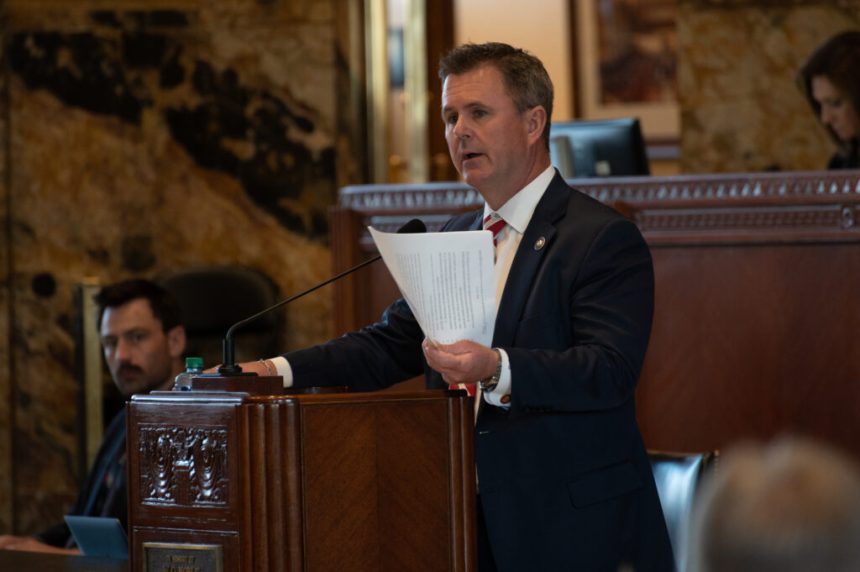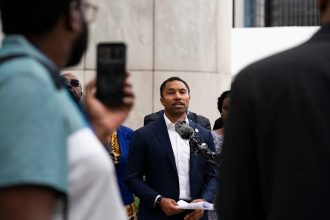Rep. Beau Beaullieu, R-New Iberia, is backing bills to move back dates on Louisiana’s 2026 election calendar to allow for a possible U.S. Supreme Court case that could reshape the state’s congressional districts. (Photo by Allison Allsop/Louisiana Illuminator)
A state lawmaker behind the effort to move back Louisiana’s election calendar next year says legal experts have told him there is a chance the U.S. Supreme Court could rule on a key congressional redistricting case in time for the legislature to draw new boundaries for the 2026 midterm elections.
But Rep. Beau Beaullieu, R-New Iberia, said there is no firm date or guarantee that justices will issue their decision in time to justify the calendar change he’s proposed. Two identical bills that adjust next year’s election dates have advanced from their respective chambers through two days of a special legislative session on election laws.
The measures move next year’s primary election schedule back roughly one month. Instead of an April 18 party primary for Louisiana’s congressional races and some municipal elections, the new date would be May 16. Primary runoffs would be moved from May 30 to June 2.
The qualifying period for the election would be adjusted from Jan. 14-16 to Feb. 11-13 in the bills Beaullieu and Sen. Caleb Kleinpeter, R-Port Allen, have both co-authored.
Beaullieu said these new dates would allow Louisiana to “take advantage of a window of time” that would be created if the Supreme Court rules before the end of the year on Callais v. Louisiana. The case involves a group of white voters who sued the state over a map created in January 2024 with a second majority-Black district in the U.S. House of Representatives out of the state’s six spots.
The plaintiffs have called into question a portion of the landmark Voting Rights Act of 1965, created and amended over decades to protect the electoral strength of Black citizens. They argue Section 2, which prohibits voting laws or procedures that discriminate based on race, color or membership in a language minority group, now conflicts with the 14th and 15th Amendments of the U.S. Constitution. Those amendments cover, in part, representation in Congress and racial discrimination in voting.
Gov. Jeff Landry and Attorney General Liz Murrill, both Republicans, originally supported the version of a congressional map with two Black-majority seats. They now stand with plaintiffs and hope the Supreme Court rejects the current map that includes the 6th Congressional District, held by U.S. Rep. Cleo Fields, D-Baton Rouge, that covers a winding stretch between Baton Rouge and Shreveport.
Beaullieu, who chairs the House and Governmental Affairs Committee, confirmed he was part of a state contingency that went to Washington. D.C., for the Supreme Court’s Oct. 15 hearings on the Callais case. Justices heard from both parties in March but later asked for further arguments on the Voting Rights Act provisions.
The Louisiana group also met with Trump administration officials Oct. 15, but Beaullieu said there was no discussion of when the Supreme Court might rule on Callais.
“There was a visit at the White House, but it was more to make sure that what we were doing was giving our legislature the most flexibility [for a possible redistricting],” Beaullieu said in an interview. “They weren’t saying anything about dates or anything.”
Rep. Ed Larvadain, D-Alexandria, disputed Beaullieu’s account Friday morning during a House and Governmental Affairs hearing on the election calendar bill. He speculated, without evidence, that Landry already has been given word that the Supreme Court will throw out Louisiana’s current congressional map and will allow lawmakers to draw a new version with one or no majority-Black districts.
“The governor wouldn’t call us in and spend all this money if there wasn’t an opinion coming,” Larvadain said. “I think an opinion has already been written. It just hasn’t been dropped yet.”
Beaullieu stressed to the committee there’s no official forecast when the Callias decision will be issued. He later acknowledged to a reporter the election calendar changes he backs would become pointless if the Supreme Court doesn’t rule before the end of the year.
“We’re not going to second-guess ourselves,” Beaullieu added. “It would be the opposite if we had not had the session, and [justices] come back early enough [with a decision]. Then our hands are tied because we didn’t push the dates back. I think that would be the worst-case scenario, so I think us being proactive is the best thing for the state and the legislature.”
Black Democrats on the House and Governmental Affairs Committee pressed Beaullieu to explain his optimism for an earlier-than-usual Supreme Court ruling on the Callais case. He said lawyers have told him that because justices have heard two sets of arguments in the case, they could be inclined to rule this year instead of waiting until the spring when they typically issue their decisions after fall arguments.
Pressed to identify those lawyers, Beaullieu said they included Attorney General Murrill and House Speaker Pro Tempore Mike Johnson, R-Pineville, among others.
“I don’t know that that’s a scientific answer,” Beaullieu said. “That’s just the thoughts that are out there.”
Rep. Candace Newell, D-New Orleans, raised concerns with Beaullieu that a Supreme Court decision on Callais, followed soon by an anticipated redistricting session, might run afoul of what’s called the Purcell principle. It comes from a 2006 ruling when justices said election laws should not be changed too close to an election because it could lead to confusion among officials.
First Assistant Secretary of State Catherine Newsom told the committee her agency is prepared to move forward with next year’s elections whether they stay on their current dates or get pushed back one month.
If the legislature does revisit redistricting later this year, the secretary of state would need data from the new maps by mid-January to begin the revised three-day qualifying period Feb. 11.
The Louisiana Senate will meet Saturday and is expected to advance Kleinpeter’s versions of the Beaullieu election calendar bill and a proposal that moves five state constitutional amendments from the April ballot to May.
The House returns Monday.









